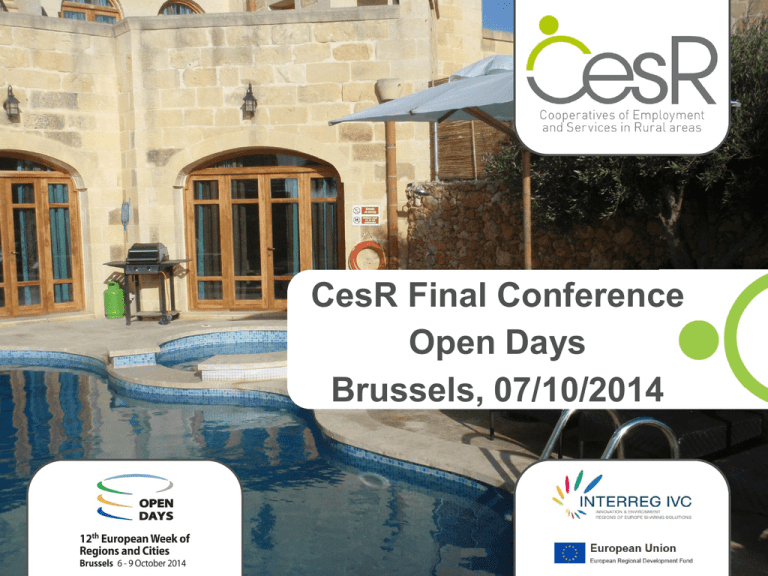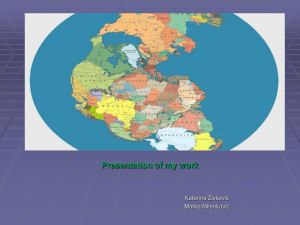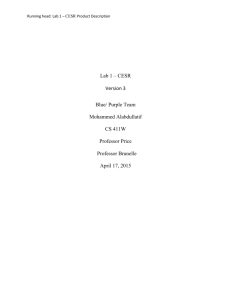Additional services
advertisement

CesR Final Conference Open Days Brussels, 07/10/2014 The CesR project: main findings and conclusions The goal of the CesR project is to identify good experiences with the tools of the regional policy, thus bestowing a positive impact on rural employment in the field of tourism and other business sectors. Brussels, 07/10/2014, CesR final conference Self catering accommodation The term self-catering accommodation concerns a category of the tourist accommodation facility that is characterized primarily by tourists staying in these facilities, paying for them as well as providing and preparing meals for themselves. Self-catering accommodation is for commercial use, renting for tourists. Brussels, 07/10/2014, CesR final conference The term self-catering accommodation describes a category of accommodation in which few services could be offered, and (especially) the visitors prepare their own food. This group of accommodation includes the following categories: Some scientific problems • In some regions there are not a statistical category or a term corresponding to “self-catering accommodation”, e.g. Czech Republic, Poland • e.g. in these two countries B&B sector is included into the selfcatering sector • We have some difficulties in statistical comparisons • In many cases, unfortunately, regional level statistics are not as detailed as in national level statistics and in some cases data is not available. Cottages Houses/boungalows/farmhouses Flats Chalets Campsite Mobile homes / boats (Lynch, Johns, 2007), additionaly: manors, castles and even mountain huts (Nicod et al. 2007) Focus on SCA in Europe Number of facilities Pieriga region in Latvia Cork County in Ireland Auvergne in France Małopolska region in Poland Olomouc region in the Czech Republic Pomurje region in Slovenia Province of Granada in Spain Gozo on Malta region of Troodos in Cyprus 9000 8000 7000 6000 5000 4000 3000 2000 1000 0 Number of beds 80000 70000 60000 50000 40000 30000 20000 10000 0 Focus on SCA in Europe Share of self-catering accommodation Pieriga region in Latvia Cork County in Ireland Auvergne in France Małopolska region in Poland Olomouc region in the Czech Republic Pomurje region in Slovenia Province of Granada in Spain Gozo on Malta region of Troodos in Cyprus 50 45 40 35 30 25 20 15 10 5 0 Business models which maximize the creation of offers and services in self-catering accommodation Individual owner Holiday farm (e.g. holiday resort, campsite) , with homes for rental - one owner Cooperation of the group of individual owners a management company created to rent bedrooms and self-catering apartments, owned by various investors Common offer of the individual hauses joined with a hotel (the same owner) (joint management with hotels) Creation of the network of individual houses (owned one by one) – e.g. in the international market: Interhome, Novasol Brussels, 07/10/2014, CesR final conference Objectives of the SCA strategy - Increase of the direct and indirect income from tourism - Increase the number of arrivals / tourists - Increase the annual season period - Improve the sustainability of the tourist business - Upgrade of the tourist experience, upgrade tourist product with significant value added Brussels, 07/10/2014, CesR final conference Additional services economic impact Some owners rent their second homes for some period to reduce maintenance costs. Self catering accommodation offers additional possibilities of creating services that could influence local development. Brussels, 07/10/2014, CesR final conference Types of additional services provided at the premises of self-catering accommodation On-site - (within the facility) * * on-site means that the services are provided both indoors (e.g. apartment, or house) and outdoors (e.g. garden) within the premises. accommodation services Night-time accommodation and related services Outside the facility Tourist activities Transport organization of free time Additional food services Services / Entertainment High standard accommodation in rural areas on Gozo A historical tower as a place for the romantic dinners Brussels, 07/10/2014, CesR final conference Return back Self-catering accommodation Renovated old house Auvergne, FRANCE Renovated old farm Cork, IRELAND Return of people back to their roots, villages and traditional way of life. Agriculture and livestock products, processing. Regional labeling and certification. Revival of villages and local economies. Agritourism and other tourism niche offerings – together with additional services offered. Brussels, 07/10/2014, CesR final conference Social Cooperative „Haven” services example of social cooperative that create stable full and part-time jobs which are tailored to vulnerable groups in the labour market (est. 2012) • public-private initiative: • employees: 18 persons on full-time contracts + 6 persons on job contracts • preparation of meals, delivery and catering services for: – three schools (> 400 meals daily) – residents & people working in local comapnies (ca. 40 meals daily) – meetings, conferences and events • • maintenance and housekeeping services in three schools running a guesthouse (20 beds) and dealing with tourists (in certain months the Cooperative’s income share from tourism services comes to 30%) • other tourist services: – guiding tourists to the surrounding hills (some of members are licensed mountain guides) – helping tourists to organize their excursions: from coach excursions to advising on walking or riding a bicycle itineraries – organizing meetings and different events in the guesthouse’s fully equipped conference room (i.e. conferences, courses, integration parties, birthdays, weddings, etc.) – organizing sleigh rides for the tourists • preparing local cultural activities Social Cooperative „Haven” good practice • this good practice demonstrates that creation of social cooperative can: – provide direct benefits for spectrum of local community’s members – result in creating additional jobs in rural areas – reintegrate unemployed people into society and create relationships – help local tradition to survive (cultural activities of the cooperative) – increase economic activity in the local area – increase tourism flow in the local area – become a new source of income for nongovernmental organizations „Haven” services preparation of meals, delivery and catering services maintenance and housekeeping services tourism services running a guesthouse (20 beds) three schools (> 400 meals daily) catering options : self-catering, bed & breakfast, half-board, full-board, stocked up refrigerator residents & people working in local companies (ca. 40 meals daily) three schools helping tourists to organize their excursions: from coach excursions to advising on walking or riding a bicycle itineraries guiding tourists to the surrounding hills (some of members are licensed mountain guides) meetings, conferences and events organizing meetings and different events in the guesthouse’s fully equipped conference room (i.e. conferences, courses, integration parties, birthdays, weddings, etc.) Common characteristics of the presented case studies - Determined people (group of friends, individual, a couple) - Passion and experience - Tourist potential of the place of destination - Creation of tourist products based on customers expectations (important role of packages) - Cooperation with local companies – synergy effect (additional services) -Focus on niche market e.g. weddings, diving, skiing activities, ornithologists RESULT: creation of a very personalized stay for tourists Brussels, 07/10/2014, CesR final conference General conclusions There are many scientific problems for defining the self-catering accommodation and second homes as well (e.g. definitions, statistics) Share of self-catering accommodation in many European regions is relatively high (more than 30%) Seasonality is a major issue in self-catering accommodation There are many common initiatives and possibilities of additional services creation in both self-catering accommodation and second homes Brussels, 07/10/2014, CesR final conference Future of the self-catering sector There is a strong base for the further development of the selfcatering accommodation sector and additional services, especially in rural areas. The quality of services and accommodation together with better promotion (branding, tourist packages) and personalized offer(s) are main areas for development – for beeing visible and atracting tourists. Brussels, 07/10/2014, CesR final conference www.cesr-project.eu



